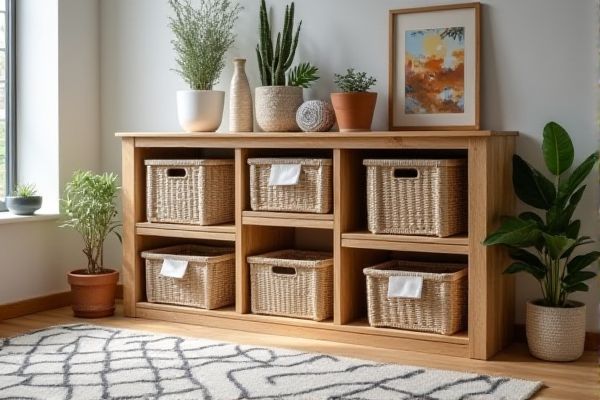
Cube storage offers customizable compartments ideal for organizing books, toys, and decor, while basket storage provides flexible, portable solutions perfect for concealing miscellaneous items and reducing clutter. Explore the rest of the article to discover which storage option best suits your organizational needs and home style.
Table of Comparison
| Feature | Cube Storage | Basket Storage |
|---|---|---|
| Design | Modular, compact, cube-shaped compartments | Open, flexible containers made from woven materials |
| Use Case | Organizing small to medium items neatly | Storing bulky or irregularly shaped objects |
| Material | Often plastic, wood, or metal | Naturally woven fibers such as rattan, wicker, or fabric |
| Stackability | Yes, cubes can be stacked securely | No, baskets are generally stackable only when empty |
| Ventilation | Limited ventilation due to enclosed design | High ventilation, ideal for airflow-sensitive items |
| Portability | Less portable, heavier depending on material | Lightweight and easy to carry |
| Customization | Available in various sizes and colors, often customizable | Varied shapes and sizes but less modular |
| Durability | Generally more durable and rigid | Can be fragile depending on material quality |
Introduction to Cube and Basket Storage
Cube storage offers modular, stackable compartments ideal for organizing books, decor, and office supplies, maximizing vertical space efficiently. Basket storage provides flexible, open-weave containers perfect for storing miscellaneous items with easy access and a casual aesthetic. You can enhance your room's organization by combining both solutions to suit varied storage needs and style preferences.
Design and Aesthetic Differences
Cube storage features a modular design with uniform square compartments that offer a clean, structured look ideal for modern and minimalist interiors. Basket storage incorporates woven or fabric containers, providing a softer, textured aesthetic that complements rustic, bohemian, or cozy decor styles. Both options enhance organization but cater to different visual preferences, with cube storage emphasizing geometric precision and basket storage offering organic warmth.
Material Durability and Maintenance
Cube storage units are typically made from sturdy materials like engineered wood or metal, offering excellent durability for long-term use with minimal maintenance required. Basket storage often utilizes woven materials such as rattan, wicker, or fabric, which may be less durable and more prone to wear, requiring more frequent cleaning and care to maintain appearance. Choosing cube storage can provide a more robust and low-maintenance solution for Your organization needs.
Storage Capacity Comparison
Cube storage units typically offer more structured and maximized storage capacity with individual cubbies designed to hold items securely and prevent them from shifting. Basket storage provides flexible capacity as baskets can accommodate irregularly shaped items and be easily rearranged, but may result in less efficient use of space overall. To optimize your storage area, consider cube storage for neatly categorized items and basket storage for bulkier or varied belongings.
Space Efficiency and Organization
Cube storage offers superior space efficiency by maximizing vertical and horizontal space, fitting neatly into small or irregular areas to keep Your belongings organized without clutter. Basket storage provides flexible organization, allowing easy access and versatility for different-sized items but often requires more space due to its bulkier design. Choosing cube storage optimizes compactness and categorization, ideal for maximizing limited spaces efficiently.
Versatility in Home Settings
Cube storage offers customizable compartments that adapt easily to various room sizes and purposes, making it highly versatile for bedrooms, living rooms, and offices. Basket storage provides a flexible and breathable solution ideal for organizing clothing, toys, or laundry, seamlessly blending into casual or rustic decor. Your choice depends on the need for structured organization versus flexible, easy-to-move storage options.
Accessibility and Ease of Use
Cube storage offers easy accessibility with open compartments that make it simple to retrieve and organize items quickly, especially in frequently used spaces. Basket storage provides a more contained solution, often with handles for portability, but may require extra effort to access items stacked at the bottom. Your choice depends on whether effortless visibility or compact containment is more important for your organizational needs.
Cost Analysis: Which is More Affordable?
Cube storage units typically offer more affordable options due to their modular design and efficient use of materials, making them cost-effective for both small and large spaces. Basket storage often incurs higher costs because baskets are individually crafted from varied materials like wicker or fabric, which can increase price depending on quality and design. Evaluating your budget against the scale and style of storage needed will help determine whether cube or basket storage is the more economical choice for your space.
Environmental Impact and Sustainability
Cube storage systems often use materials like engineered wood, which can be sourced sustainably and are recyclable, reducing environmental impact. Basket storage typically involves natural fibers such as wicker or seagrass, which are biodegradable and have a lower carbon footprint in production. Your choice between cube and basket storage can influence sustainability by prioritizing renewable resources and end-of-life biodegradability.
Choosing the Best Storage for Your Needs
Cube storage offers modular design and customizable compartments ideal for organizing books, toys, and clothing in small spaces. Basket storage provides flexible, breathable containers perfect for storing irregularly shaped or delicate items like linens and accessories. Selecting the best storage depends on your space constraints, item types, and desired aesthetic, ensuring functionality and ease of access.
 homyna.com
homyna.com